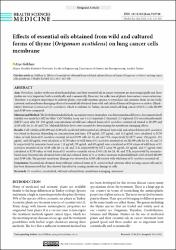| dc.description.abstract | Aim: Nowadays, studies on the use of medicinal plants and their essential oils in cancer treatment are increasing rapidly and these studies are very important both scientifically and economically. However, the collection of plants from nature causes extinction. Therefore, it is of great importance to cultivate plants, especially endemic species, to reproduce and consume them. In our study, cytotoxic and membrane damaging effects of essential oils obtained from wild and cultured forms of Origanum acutidens (Hand.- Mazz.) Ietswaart (Lamiaceae) (O. acutidens), which is endemic to Turkey, on non-small-cell lung cancer (NSCLC) cells H1299 and A549 were compared. Material and Method: The level of malondialdehyde, an oxidative stress biomarker, was determined in cell lysates. Assessment of cell viability was made by CellTiter-Blue® Cell Viability Assay and 3-(4,5-dimethyl-2-thiazolyl)-2,5-diphenyl-2H-tetrazoliumbromide (MTT) assay after 10- 250 μg/mL concentrations of wild and cultured forms of O. acutidens essential oil treated to H1299 and A549 cells for 24, 48 and 72 h. Malondialdehyde levels were assayed for determining the membrane damaging effects. Results: Cell viability of H1299 and A549 cells incubated with essential oils obtained from wild and cultured forms of O. acutidens was found to decrease depending on concentration and time. 179 μg/mL, 157 μg/mL, and 132 μg/mL were calculated as IC50 values of wild form of O. acutidens essential oil on H1299 cells for 24, 48, and 72 h, respectively by MTT assay. 150 μg/mL, 131 μg/mL, and 110 μg/mL were calculated as IC50 values of wild form of O. acutidens essential oil on H1299 cells for 24, 48, and 72 h, respectively by resazurin-based assay. 118 μg/mL, 99 μg/mL, and 69 μg/mL were calculated as IC50 values of wild form of O. acutidens essential oil on A549 cells for 24, 48, and 72 h, respectively by MTT assay. 98 μg/mL, 83 μg/mL, and 57 μg/mL were calculated as IC50 values of wild form of O. acutidens essential oil on A549 cells for 24, 48, and 72 h, respectively by resazurinbased assay. Essential oils obtained from wild and cultured forms of O. acutidens increased malondialdehyde level on both H1299 and A549 cells. The greatest membrane damage was observed in A549 cells treated with wild form of O. acutidens essential oil. Conclusion: Essential oils obtained from wild and cultured forms of O. acutidens had cytotoxic effect on lung cancer cells and it has been demonstrated that they showed this effect by causing membrane damage in cells. | en_US |


















